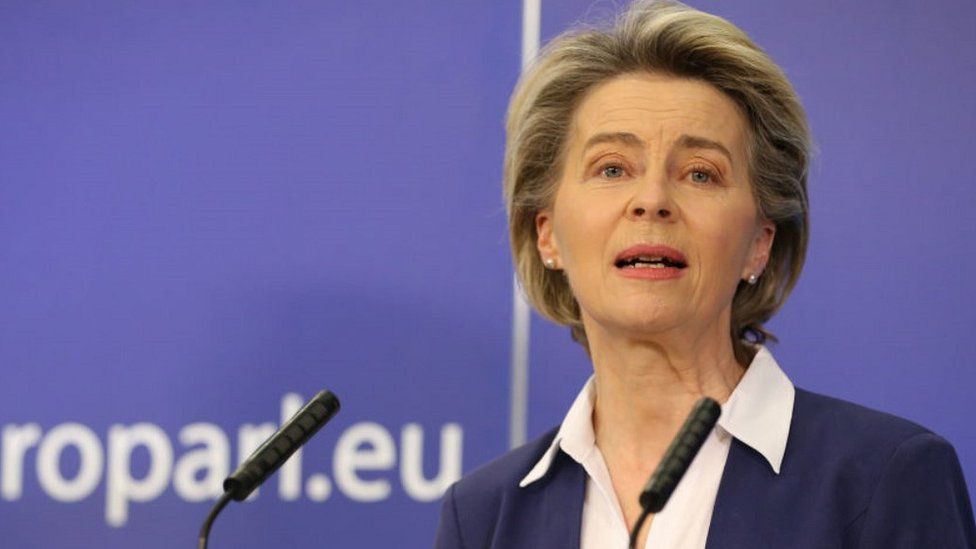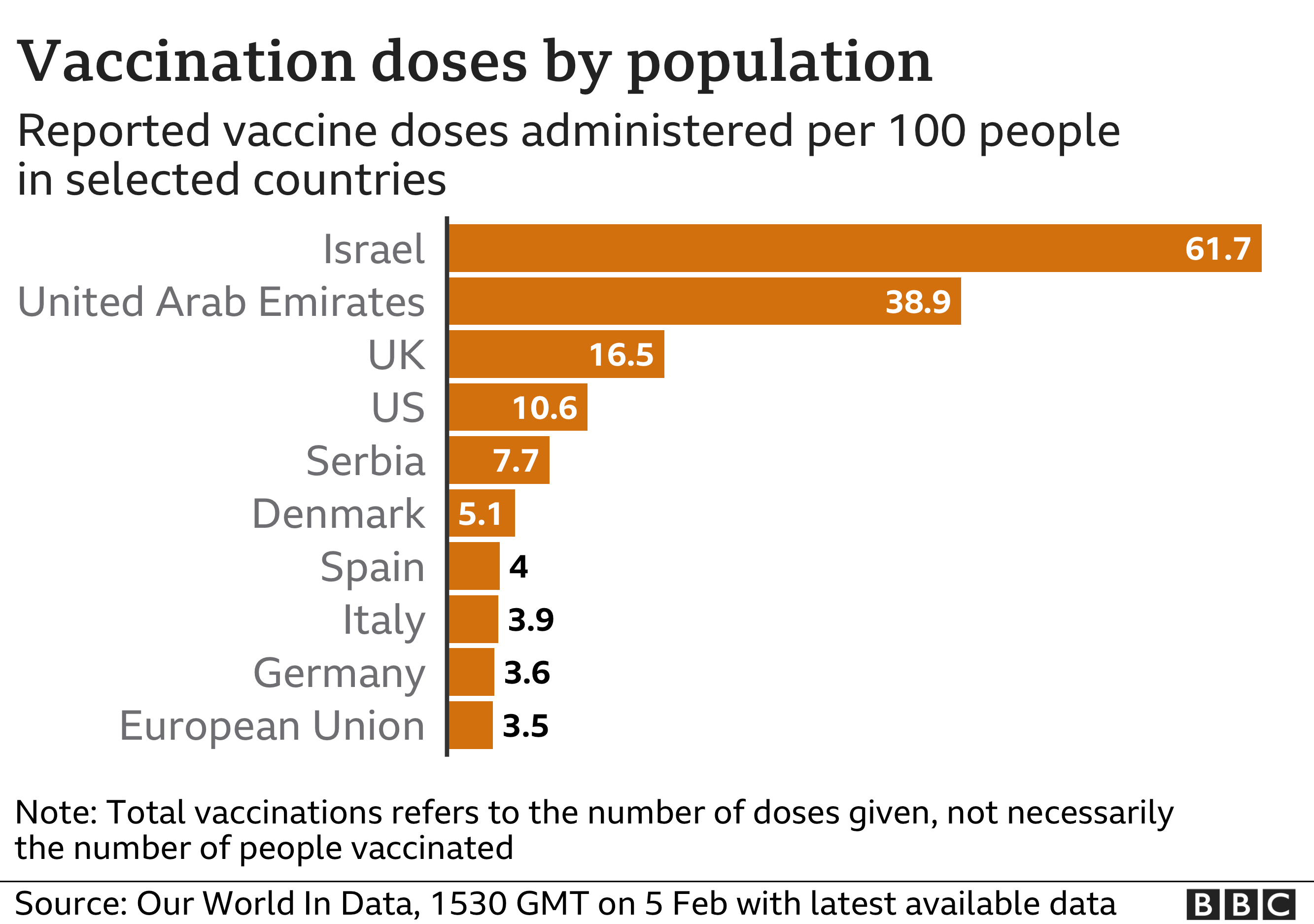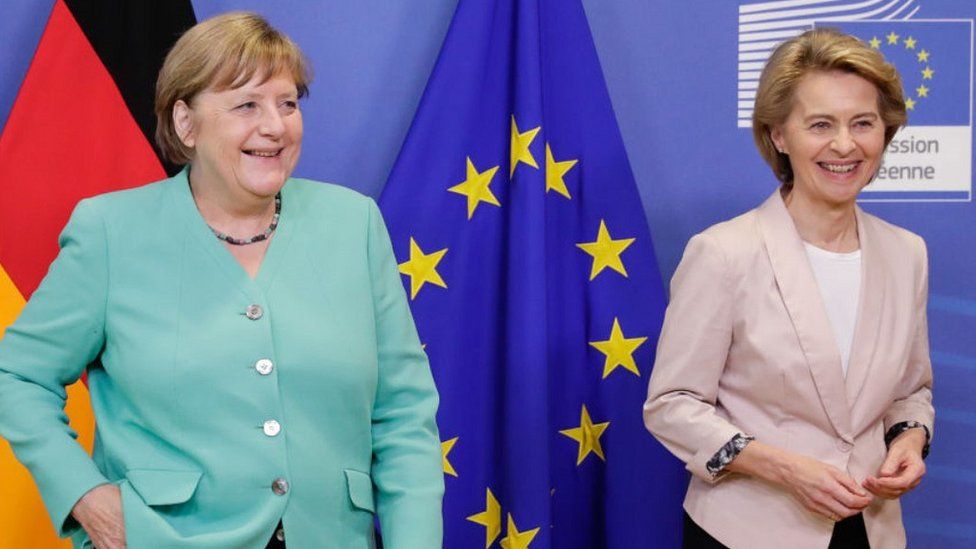Covid: Vaccine tensions stoke German criticism of EU's von der Leyen
 image copyrightGetty Images
image copyrightGetty Images"A country can be a speedboat, the EU is more like a tanker," said European Commission President Ursula von der Leyen, after a week of hefty criticism for the slow rollout of the vaccine in Europe.
It was the first time she had admitted the European Union had made mistakes. More focus should have been put on production and delivery, not just on developing the vaccine, she told German newspaper Süddeutsche Zeitung on Friday.
In Ursula von der Leyen's home country many are asking why a vaccine invented by a German company is being rolled out successfully in the UK and the US, but not quickly enough in Europe. The Pfizer-BioNTech vaccine was the first to be approved in the UK, and then the EU.
Slow start for German rollout
So far in Germany around three million vaccine doses have been injected, compared with almost 11 million in the UK; 400 mass vaccination centres have been built around Germany, but many are still standing empty waiting for enough vaccine doses to be delivered.
Meanwhile, the death rate remains high, typically still reaching almost 1,000 deaths per day. More than 60,000 people have now died with Covid-19.


But international headlines of anti-EU outrage in Germany are exaggerated. Much of the German criticism of Ursula von der Leyen has come from long-standing left-wing adversaries or right-wing rivals.
The most ferocious critics of her and of the EU's vaccine strategy have come from the UK and the US.
Solidarity with rest of EU
The broader vaccine debate here is more nuanced. German commentators and politicians have been impressed with the rollout in the UK. But they also know that the British death toll is one of the highest in the world. Overall the UK's handling of the pandemic is not seen in Germany as a model to follow.
Meanwhile, infection rates in Germany are dropping steadily. The incidence of cases per 100,000 over seven days is 80. In the UK it is 224.
The vaccine rollout has reached 3.5% of the EU population, and yet there is broad acceptance in Germany that it was correct to act in solidarity across all 27 countries and help less wealthy or smaller European states get the vaccine.
Angela Merkel has repeatedly stood by the decision and she is said to have defended Mrs von der Leyen too. "The decision to order vaccines together as the European Union is and was right," she said on Friday.
 image copyrightAFP
image copyrightAFPSome of the spicier comments about the rollout have more to do with Germany's upcoming election year.
Olaf Scholz, Germany's finance minister and vice-chancellor, reportedly condemned the EU Commission's vaccine strategy during a cabinet meeting as a "real pile of crap".
However, Mr Scholz is a centre-left Social Democrat, who hopes to beat Mrs Merkel's conservative bloc in September's election and become Germany's next chancellor. His party is struggling in the polls and he is keen to distance himself from the vaccine strategy of a government he is part of.
Other regional leaders are similarly keen to talk about the EU's procurement problems, to distract from local hitches, such as dysfunctional appointment booking systems.
The European Commission is being criticised, but so are some ministers and regional leaders. Most worrying of all for Angela Merkel is that, for the first time in the pandemic, she is also under fire.
Over the past year, her calm, fact-based style and scientific background has reassured voters. But the mood is shifting, partly because of the slow vaccine rollout. At times polls have shown up to 80% approval ratings for the German government's handling of the pandemic. Now it's less than 50%.
You know things are bad when Angela Merkel appears on your television screen: whenever the German chancellor feels under pressure, she does what she rarely does and gives a TV interview. This week she gave two.



No comments